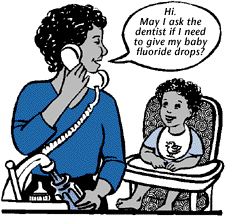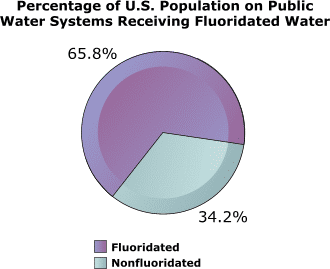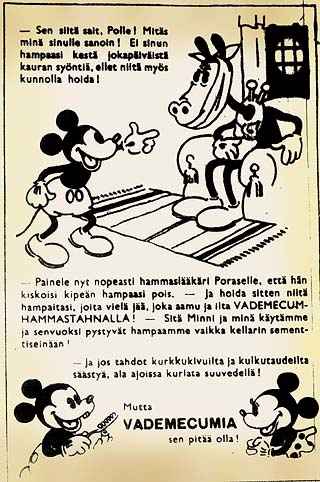rotten > Library > Conspiracy > Fluoridation
Fluoridation
"Have you ever heard of a thing called fluoridation?—fluoridation of water? . . . Do you realize that fluoridation is the most monstrously conceived and dangerous Communist plot we have ever had to face? . . . Do you realize that in addition to fluoridating water—why, there are studies under way to fluoridate salt, flour, fruit juices, soup, sugar, milk, ice cream? Ice cream, Mandrake!—children's ice cream!
"Do you know when fluoridation first began? . . . Nineteen hundred and forty-six. 1946, Mandrake. How does that coincide with your post-war Commie conspiracy, huh?
"It's incredibly obvious, isn't it? A foreign substance is introduced into our precious bodily fluids without the knowledge of the individual—certainly without any choice. That's the way your hard-core Commie works."
-- Gen. Jack D. Ripper, Dr. Strangelove
|
 |
Is your drinking water trying to kill you?
Some people think so. And still more think: Why take a chance?
More than four out of five dentists agree that fluoride will reduce cavities. But non-dentists are kind of split.
 Fluoride is a naturally occurring mineral used to fight tooth decay in children and also used to poison rats. This is the sort of juxtaposition that gets people upset.
Fluoride is a naturally occurring mineral used to fight tooth decay in children and also used to poison rats. This is the sort of juxtaposition that gets people upset.
The defenders of fluoridation, the practice of adding a small amount of fluoride to drinking water in order to fight tooth decay, are forced to respond to comments about these contradictory uses of fluoride by explaining that it's a matter of dosage. The amount of fluoride used to fight cavities is very small, you see, whereas the amount of fluoride in rat poison is very large.
This isn't exactly the most viscerally satisfying response. A concerned parent wants to hear "we are NOT adding rat poison to your children's drinking water," but instead they're being told "we're not adding MUCH rat poison to your children's drinking water."
On the other hand, Americans are the kings of ingesting toxic substances at sub-lethal levels. A shot of whiskey is fine, but drink three fifths in the course of an evening, and you'll have some trouble. Glue-sniffing was briefly a national fad, and it's still practiced, along with cocaine, heroin, whippets and ecstasy, all of which are highly toxic in large doses.
On the other other hand, alcohol is regulated to keep it away from minors, and all of the latter examples are entirely illegal. But you can find plenty of other examples, like nutmeg and Robotussin. Both are perfectly legal, one as a tasty seasoning and the other as a child's cough syrup in small doses. They're both middling hallucinogens in large doses and entirely toxic in still larger doses.
So you can see, the whole thing is kind of a sticky issue. But there are several elements of the debate which make fluoride more contentious than nutmeg. Chief among these is the fact that no one is pumping nutmeg into your drinking water.
 For another thing, there's the way that fluoride was discovered. Around the dawn of the 20th Century, a dentist noticed that the people of Colorado Springs all had miserably ugly stains on their teeth. It was eventually discovered that this was caused by high levels of fluoride in their water supply, which was causing a mild disease due to overexposure. But at the same time, it was noted that the people of the area had much fewer cavities than the norm.
For another thing, there's the way that fluoride was discovered. Around the dawn of the 20th Century, a dentist noticed that the people of Colorado Springs all had miserably ugly stains on their teeth. It was eventually discovered that this was caused by high levels of fluoride in their water supply, which was causing a mild disease due to overexposure. But at the same time, it was noted that the people of the area had much fewer cavities than the norm.
This led to the conclusion that smaller doses of fluoride could prevent tooth decay without causing the discoloring, but the fact is that fluoride was first discovered due to its negative effects.
When dentists learned about this new technique, there was a rush to get the "benefits" of fluoride out to the American public. With a very short span between the early 1940s and the late 1950s, fluoridation flooded into American communities, often with very little public debate.
By the time people started asking hard questions about fluoride, it was too late. Today, two thirds of the United States population drinks fluoridated water.
The push to get fluoride into drinking water was a nearly unprecedented success in government implementation during a time when major new technologies were transforming the world. At the very same time that fluoride was being rolled out to the public in dramatic fashion, the country was embracing the newfound miracle of atomic power, which was presented as a clean, safe alternative to fossil fuels.
 Just as atomic power turned out to be a little messier than advertised, research began raising questions about fluoridation, which had been rapidly spread all over the country as the result of a full-court press by dental industry lobbyists and federal health agencies.
Just as atomic power turned out to be a little messier than advertised, research began raising questions about fluoridation, which had been rapidly spread all over the country as the result of a full-court press by dental industry lobbyists and federal health agencies.
A major irritant to many people was the fact that the fluoridation of drinking water was, as often as not, presented as a statewide mandate which took the choice away from local (and suspicious minded) communities. People don't like that.
It also raises further question: Why fluoride? Why not have make it mandatory to add Vitamin C to drinking water? Or Vitamin B-12? Or calcium? Or zinc? Or echinacea? All of these things are theoretically good for people. In fact, most of them are arguably more important to good health than fighting cavities.
The dynamics of the fluoridation debate tend to run counter to the usual conspiracy/skeptic debate. With most conspiracy theories, it's the theorists who cite a lot of dicey statistics and launch a lot of ad hominem attacks on their opponents. In the fluoridation debate, it's the establishment, which frequently makes blanket statements to the effect that anyone worried about fluoridation is just a crackpot.
But in point of fact, there are actually rather a lot of valid concerns regarding fluoride in the diet. The major worries regarding fluoridation include:
- There isn't any scientific body of work that examines how much fluoride is in the environment and food supply of the average American, a key point raised by not-quite-a-fluoridation-conspiracy-nut-but-at-least-a-fluoridation-skeptic Ralph Nader. That means there's no way of knowing just how much fluoride kids (and adults) are actually ingesting on any given day. Since we've already established that only the dosage differentiates toothpaste from rat poison, this is a pretty important question.
-
If you read your toothpaste label, you will see a warning demanding you contact a doctor immediately if you accidentally swallow some toothpaste. We go out of our way to make everything from Play-Doh to magic markers non-toxic, but we give kids toothpaste and tell them to put it in their mouths?

-
The EPA's professional union (including scientists and engineers) is on the record opposing the fluoridation of water. According to their statement, "Our members' review of the body of evidence over the last eleven years, including animal and human epidemiology studies, indicate a causal link between fluoride/fluoridation and cancer, genetic damage, neurological impairment, and bone pathology. Of particular concern are recent epidemiology studies linking fluoride exposure to lowered IQ in children. As the professionals who are charged with assessing the safety of drinking water, we conclude that the health and welfare of the public is not served by the addition of this substance to the public water supply."
-
While many things are in dispute regarding fluoride, the effects of an overdose are not. They include drooling, tremors, weakness, convulsions, labored breathing, nausea, vomiting, diarrhea, abdominal pain and shock. And that's just for a short-term overdose. Long-term exposure to excessive doses of fluoride causes bow-leggedness, arthritis, paralysis and makes people into hunchbacks.
-
According to one anti-fluoride researcher, Dr. John Lee, "The goal of our public water facilities should be to provide water that is as pure and safe as possible and not as a vehicle for universal pharmacological treatments regardless of age, the health status of the individual, or the presumed benefit, which, in the case of fluoride, is highly questionable, to say the least." This seems quite reasonable. Shouldn't water just be water?
It's not like fluoridation is universally accepted worldwide; and it's not just poor and underdeveloped countries that have rejected it. Nations in Asia and Africa have adopted fluoridation programs at the insistence of Western science, with often mixed or decidedly negative results, including in China, India and South Africa. Among the crackpots rejecting the fluoridation of drinking water are the governments of Germany, Switzerland, the Netherlands, Sweden, Denmark, Finland, Norway, Iceland, Belgium, Austria and France.
But hey, what do the Swiss know, right?
Pornopolis |
Rotten |
Faces of Death |
Famous Nudes
|


 Fluoride is a naturally occurring mineral used to fight tooth decay in children and also used to poison rats. This is the sort of juxtaposition that gets people upset.
Fluoride is a naturally occurring mineral used to fight tooth decay in children and also used to poison rats. This is the sort of juxtaposition that gets people upset.  For another thing, there's the way that fluoride was discovered. Around the dawn of the 20th Century, a dentist noticed that the people of Colorado Springs all had miserably ugly stains on their teeth. It was eventually discovered that this was caused by high levels of fluoride in their water supply, which was causing a mild disease due to overexposure. But at the same time, it was noted that the people of the area had much fewer cavities than the norm.
For another thing, there's the way that fluoride was discovered. Around the dawn of the 20th Century, a dentist noticed that the people of Colorado Springs all had miserably ugly stains on their teeth. It was eventually discovered that this was caused by high levels of fluoride in their water supply, which was causing a mild disease due to overexposure. But at the same time, it was noted that the people of the area had much fewer cavities than the norm.  Just as atomic power turned out to be a little messier than advertised, research began raising questions about fluoridation, which had been rapidly spread all over the country as the result of a full-court press by dental industry lobbyists and federal health agencies.
Just as atomic power turned out to be a little messier than advertised, research began raising questions about fluoridation, which had been rapidly spread all over the country as the result of a full-court press by dental industry lobbyists and federal health agencies.